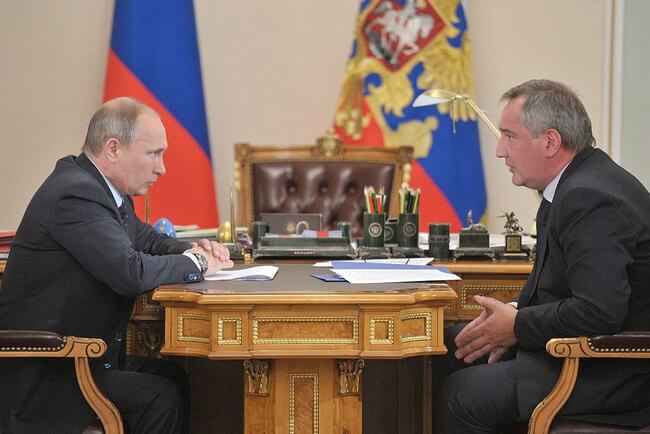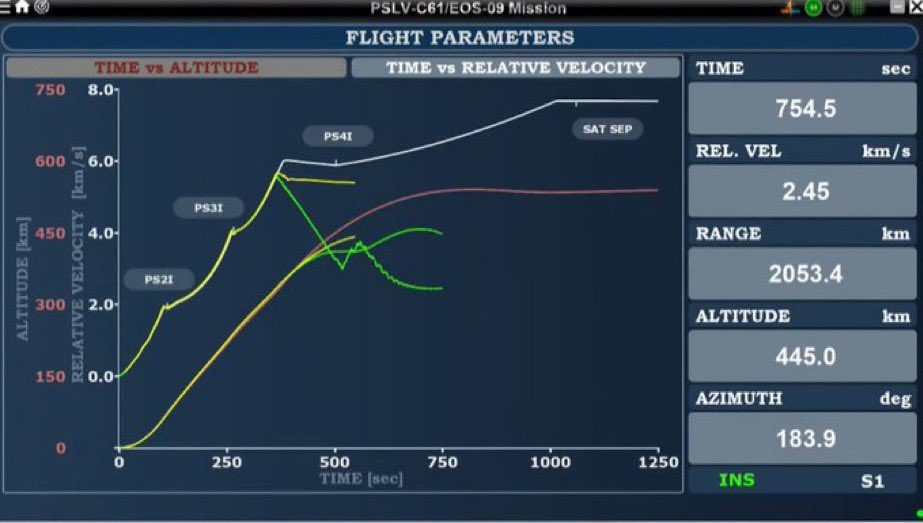After three and half years in the job, the mild-mannered technocrat Igor Komarov has been given his marching orders by Russian President Vladimir Putin from his position as head of Roscosmos. The reason for Komarov’s departure has not been disclosed. Replacing him is former deputy prime minister, Dmitry Rogozin, a harder-edged Putin loyalist with a Trump-like reputation for rubbishing his (and Putin’s) opponents at home and abroad.
As the new Director General, Rogozin will be in charge of Russia’s space programme as most of Russia’s space companies are controlled by Roscosmos. His appointment could make dealing with Roscosmos and its subsidiaries very difficult since he was put on US and EU sanctions lists after Russia’s annexation of Crimea. It will be interesting to see if Rogozin will even be able to attend the Heads of Space Agencies meeting at the International Astronautical Congress in Bremen, Germany, in October.

President of Russian, Vladimir Putin, appoints Dmitry Rogozin as head of Roscosmos. Courtesy: Roscosmos
Rogozin will have his work cut out on other issues as well. Russia has been looking over its shoulder at new reusable and heavy-lift launch vehicle technology in the West, and at the rapid advances made by space upstart nations such as China and India. Meanwhile, its faltering economy meant that Roscosmos was starved of the roubles needed to finance a major expansion of its once proud space effort.
This may change with the recent oil price rise, which gives the oil-exporting economy a chance to recover. Russia’s space programme may be a beneficiary of this, but it remains reliant on old designs and technology. A large investment is needed to get new designs operational as fast as possible. Even the “new” Angara rocket family, which has had a protracted development, has yet to reach full operational status, while the overbudget and much delayed Vostochny Cosmodrome in Far Eastern Russia where Angara will mainly operate from has yet to be completed.
In the meantime, some clever make-do-and-mend ingenuity has just about kept Russia’s space programme in the fight. One example is Khrunichev’s stage-cutting modification to the Proton rocket, which made the expendable Proton Medium competitive against SpaceX’s part-reusable Falcon 9 – even if a de facto US prohibition on US space hardware flying on it after 2023 (it is actually a ban on US military use of commercial satellites flown by Russian rockets after that date) may make it commercially unusable.
The fact remains, however, that the Russian space effort is a shadow of its former self with obsolete launch vehicles and satellites, an ageing workforce, a reputation for poor reliability and quality control, financial scandal, inefficiency, bureaucracy and mismanagement and – worst of all – a lack of sufficient funding.
Until all that changes, replacing the head of Roscosmos will probably have no effect at all
Update on 2 June 2018: On 24 May Interfax reported that the Proton Medium (Proton-L) programme was being cancelled “for economic reasons”. International Launch Services (ILS) – the launch marketing arm of Khrunichev, has formally denied this report. Karen Soriano of ILS states: “The Proton Medium has not been cancelled. Quite the contrary, the program is the highest priority at Khrunichev and the development program continues on schedule. We look forward to serving our first customer for Proton Medium, Eutelsat. Future launches on Proton Medium will be announced this month.”
Comment by David Todd: Thankfully this shining light of needs-must creativity and resourcefulness in the Russian space programme now looks to set to survive – at least for now. The Proton Medium (aka Proton L) rocket, which achieves its cost-effectiveness by eliminating the standard Proton M’s third stage and having a lengthened second stage instead, has been attracting interest. As Karen Soriano notes, the international satellite operator Eutelsat has placed a launch booking on the new rocket, with other clients about to be announced. Nevertheless, whether Proton Medium can continue after 2023 remains to be seen.







